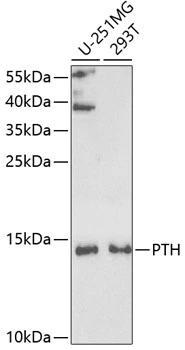Parathyroid Hormone antibody
GTX27843
ApplicationsImmunoFluorescence, ImmunoPrecipitation, Western Blot, ImmunoCytoChemistry, ImmunoHistoChemistry, ImmunoHistoChemistry Frozen, ImmunoHistoChemistry Paraffin
Product group Antibodies
TargetPTH
Overview
- SupplierGeneTex
- Product NameParathyroid Hormone antibody
- Delivery Days Customer9
- Application Supplier NoteFor WB: Use at a dilution of 1:100-1:200. For IP: Use at an assay dependent dilution. For IHC: Use at a dilution of 1:40-1:80. This antibody can be used on frozen tissue sections and on formalin-fixed, paraffin-embedded tissue sections. Prolonged fixation in buffered formalin can destroy the epitope. The antibody may be used at a dilution of 1:40-1:80 with Auto/Probe III. Auto/Zyme (Cat# GTX73183) predigestion or high temperature antigenic unmasking (see instructions below) is required with this antibody prior to application of this antibody with formalin-fixed, paraffin-embedded tissue. The optimum dilution factor should be determined be individual laboratories.
- ApplicationsImmunoFluorescence, ImmunoPrecipitation, Western Blot, ImmunoCytoChemistry, ImmunoHistoChemistry, ImmunoHistoChemistry Frozen, ImmunoHistoChemistry Paraffin
- CertificationResearch Use Only
- ClonalityPolyclonal
- Concentration1 mg/ml
- ConjugateUnconjugated
- Gene ID5741
- Target namePTH
- Target descriptionparathyroid hormone
- Target synonymsFIH1, PTH1, parathyroid hormone, parathormone, parathyrin, parathyroid hormone 1, prepro-PTH, preproparathyroid hormone
- HostRabbit
- IsotypeIgG
- Protein IDP01270
- Protein NameParathyroid hormone
- Scientific DescriptionThis gene encodes a member of the parathyroid family of proteins. The encoded preproprotein is proteolytically processed to generate a protein that binds to the parathyroid hormone/parathyroid hormone-related peptide receptor and regulates blood calcium and phosphate levels. Excess production of the encoded protein, known as hyperparathyroidism, can result in hypercalcemia and kidney stones. On the other hand, defective processing of the encoded protein may lead to hypoparathyroidism, which can result in hypocalcemia and numbness. Alternative splicing results in multiple transcript variants. [provided by RefSeq, Oct 2015]
- Storage Instruction2°C to 8°C
- UNSPSC12352203


![IHC-P analysis of human parathyroid adenoma tissue using GTX01891 Parathyroid Hormone antibody [105G7]. Note membrane/cytoplasmic staining of tumor cells.](https://www.genetex.com/upload/website/prouct_img/normal/GTX01891/GTX01891_20200811_IHC-P_69_w_23053121_680.webp)
![WB analysis of Parathyroid Hormone (AA: 1-115)-hIgGFc transfected HEK293 cell lysate using GTX83007 Parathyroid Hormone antibody [2C7].](https://www.genetex.com/upload/website/prouct_img/normal/GTX83007/GTX83007_20170912_WB_w_23061322_129.webp)

![IHC-P analysis of human parathyroid gland tissue using GTX34948 Parathyroid Hormone antibody [3H9].](https://www.genetex.com/upload/website/prouct_img/normal/GTX34948/GTX34948_20200115_IHC-P_917_w_23060801_563.webp)
![IHC-P analysis of human parathyroid tissue using GTX34949 Parathyroid Hormone antibody [PTH/911].](https://www.genetex.com/upload/website/prouct_img/normal/GTX34949/GTX34949_20200115_IHC-P_932_w_23060801_396.webp)
![IHC-P analysis of human parathyroid tissue using GTX34950 Parathyroid Hormone antibody [SPM604].](https://www.genetex.com/upload/website/prouct_img/normal/GTX34950/GTX34950_20200115_IHC-P_934_w_23060801_315.webp)
![IHC-P analysis of human parathyroid tissue using GTX34951 Parathyroid Hormone antibody [PTH/1173].](https://www.genetex.com/upload/website/prouct_img/normal/GTX34951/GTX34951_20200115_IHC-P_930_w_23060801_967.webp)